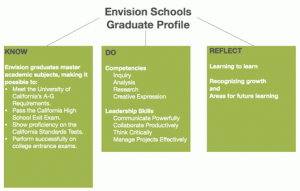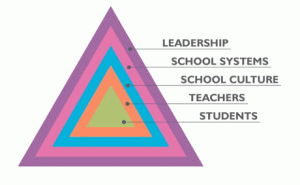Deeper Learning: Authentic Student Assessment
Is it possible to systemically embed deeper learning outcomes for students?
Dressed to the nines, Alexis, a senior at an Envision School, stands in front of a panel of adults from his school community -- teachers, counselors, administrators and other school staff -- explaining how his Political Campaign Project analytical paper is not only evidence of his ability to write at a college ready level and demonstrates his knowledge of US Government content standards, it is concrete evidence that he can think critically and communicate effectively.
Alexis pulls specific examples from his essay and compares them to the standards addressed in Envision Schools' rubric for Critical Thinking and Communication. The panel questions and probes Alexis thinking through hard evidenced based questions. After conferring as a panel, they certify that Alexis has met the criteria for graduation from his Envision School based on his performance and defense of that work.
Portfolio Defense Video from Envision Learning Partners.
This culminating event is repeated annually at all our schools for all graduates and a growing number of our Envision Learning Partners across the country. We believe that if schools and school systems clearly define their graduate outcomes for students to include not only the courses or subjects they need to pass but also Deeper Learning Outcomes -- mastering academic content, thinking critically, communicating effectively, collaborating productively and learning to learn -- we will create schools and school systems that ensure students are ready for success in college and career. At our schools, we structure and balance our graduate profile around three very simple and very concrete verbs: know, do, and reflect. The prepared graduate knows the content and the discrete skills of her academic subjects. She can do what typical college courses demand (research, analysis, inquiry) and master deeper learning outcomes. And she has the ability to reflect, a habit of self-awareness and revision that sets her on the path of continued growth.

Once we have defined the outcomes, we must create the assessments to evaluate students' mastery of these deeper outcomes. A simple bubble test will not suffice. Assessing deeper learning requires performance -- we assess collaboration by observing collaborative work and through student reflection on their ability to collaborate. In this way, we move from assessment of student learning to assessment as student learning.
Once a school or school system makes the move towards a Deeper Learning Student Assessment System, they need to consider systemic impact of this move and the capacity that needs to be built for success at every level:
- Students: What are the interventions and instructional strategies need to be employed to support all students in attaining the graduate outcomes?
- Teachers: What support and professional development do teachers need in order to provide the interventions and instructional design to support all students in attaining the graduate outcomes?
- Structures and Culture: What structural changes need to be made to the way the school uses time both for student learning and adult learning? What type of school and professional culture needs to be created to support deeper learning outcomes?
- Leadership: What do school leaders need to learn so that they can lead this change? How does the school system or school district support school leaders?

School leaders can enter the move towards a Deeper Learning Student Assessment System at any of these entry points but in order to successfully move students to deeper learning outcomes all levels of the system will need to be modified.
Envision has identified a few important levers over the course of the last ten years of developing and implementing a Deeper Learning Student Assessment System and these leverage points have been reinforced over the last two years with Envision Learning Partners work with K-12 public and charter public schools across the country:
1. Common & Validated Performance Frameworks and Rubrics
We partner with the Stanford Center for Assessment, Learning and Equity (SCALE) to develop frameworks that define the standards and outcomes that teachers use align their performance tasks. SCALE also creates rubrics that are validated with university professors to measure college readiness. It is critical that these are common within the school and the school system so that we can share tasks and calibrate towards mastery within the school and across the system. If every teacher and every school has a different framework and/or rubric it is impossible to come to a common understanding of the level of mastery as demonstrated in student work for deeper learning outcomes.
2. Exemplars and Digital Platforms
Teachers and school leaders need exemplars and ready to use deeper learning performance tasks so they can concretely see how these outcomes come to life in instructional design and samples of student work. Beginning this year, Envision and some of our deeper learning network colleagues (Asia Society, ConnectEd, New Tech Network and SCALE) will be using a new digital platform, Show Evidence to share our project units and performance tasks. Show Evidence also can be used to assess and archive the student work leading to the ability to collect and analyze student outcomes based on performance not just standardized tests.
3. Time and Capacity Building
Deeper learning requires that we rethink our school days and professional learning time. Teachers need time learn, design and assess deeper work. This requires more professional development days -- at Envision, teachers come back to school one week early (two for new teachers) and have seven student free days throughout the school year. In addition, schools build schedules that provide four hours weekly for collaborate time. Just providing time is not enough, the time needs to well planned and facilitated by leaders -- system, school and teacher.
Six months after he graduated, Alexis came back to Envision to share his experience of his first year in college. "My professors immediately assigned us writing assignments asking us to use multiple forms of evidence to support our arguments -- just like at Envision. Many of my peers did not know where to start -- but I knew exactly how to tackle this assignment and I knew I would be successful." Alexis was taking the first step towards college success and graduation.
This blog series on Deeper Learning is supported in part by the William and Flora Hewlett Foundation. The opinions expressed are those of the author(s) and do not necessarily reflect the views of The William and Flora Hewlett Foundation.